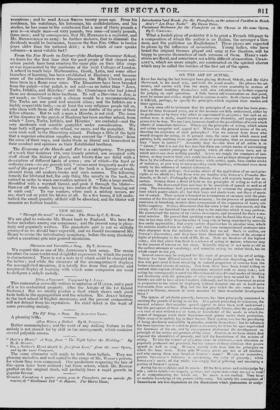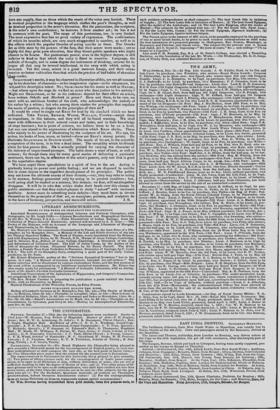ON THE ART OF ACTING.
MEAN has during the last fortnight been playing Richard, Othello, and Sir Giles Overreach, in his usual way, and with the usual results. He pleases his ad- mirers, and carries with him the many, who scorn neutrality in matters of taste, without troubling themselves with nice calculations as to their capacity for judging on such questions. A little honest selfexamination on that point, even by actors and critics, might lead to curious results. Both classes might find it difficult, perhaps, to specify the principles which regulate their studies and their opinions.
It may seem odd to insinuate that the principles of an art that has been prac. tised for three thousand years, are at this moment not fully understood, either by its professors or by those who alket to superintend its progress; but such an as. sertion were it made, would involve no necessary absurdity, and inquiry might prove it to be true. We need not, however,dwell on the possibilities of a case which admits of immediate decision. Where are the principles of acting, which actors and critics recognize and appeal to ? Where are the general terms of the art, denoting the existence of such principles ? Can we extract from those who would arrogate for acting, in its present state, the same rank which music and painting hold, anything more specific about its principles, than an assurance that they " trust to nature ? " Assuredly they do—the trust of all artists is in " nature ;" but it is not the less true that there are certain modes of ascertaining her secrets—certain principles of inquiry, which all other artists have, and to which actors can show nothing parallel. Actors are simply the creatures of imi. tation, or they trust to their own crude impulses, and perhaps attempt to chasten these by the influence of individual taste; while critics, again, have similar tricks of imitation, or give way to correspending crude impulses, redeemed even more rarely by the influence of natural refinement.
It may be said, perhaps, that acting admits of the application of no such prin•
ciples as we allude to ; but those who are familiar with STEELE'S Prosodia Ra. tionalis, or RUSH'S Philosophy of the Human Voice, will scarcely hazard the as- sertion. STEELE threw a flood of light on the principles of acting as well as of criticism. He discovered time and tune to be essentials of speech as well as of song. The schoolmen had previously pretended to estimate the proportions of time which poetry admits of; but their longs and shorts were not those of music nor of nature. Their system is founded on assumptions at valiance with the plias- nomena of the functions of our animal economy ; for the process of pulsation and remission in breathing, renders their arrangement of the sequences of heavy syl. Tables nugatory. Sl'EELE discovered that the voice is but an instrument, and the nicety of his ear furnished hint with a key to the melodies which it may perform. He ascertained the nature of its various movemeuts, and invented for these a mu- sical notation. He proved that speaking sounds may be fixed like those of song ; that in fact they differ from the notes of song only in being separated by intervals less easily appreciable ; that every variety of passion has its peculiar tune, which his notation enabled him to define ; and that even unimpassioned sentences take their character from the melodies to which they are set. Such, in outline, are STEELE'S discoveries; and they have been illustrated by some of the strongest lights of philosophy in the work of Dr. lkSH. Both arc treatises of the highest value ; and they prove that there is a science of acting in nature, whatever may be the amount of science on the stage. Scientific singing is not quite so old as the earliest attempts at vocalizing; and scientific acting, we rather think, has its whole career to run yet.
Several causes may be assigned for this want of progress in the art of acting.
Society has been illiberal enough to hold the profession degrading, and has in that way prevented it from attracting its natural proportion of votaries from the better-educated classes of society. Few from these have been found willing to embark their capitals of talent in adventures attended with so many risks; and acting has consequently wanted the illustration which cultivated modes of thinking and familiarity with the princirles of other arts might have secured for it. The Greeks are said to have ordered matters differently, and to have honoured an artist in proportion to the talent he displayed, without deeming one art in itself more honourable than another. May not the fair play which the arts seem to have enjoyed in Greece, account in some measure for their wonderful development there ?
The system of scholastic prosody, however, has been principally concerned in
stunting the growth of acting as an art. At a period preceding its existence, the musical relations that regulate speech appear to have been well understood ; but the perception of these relations became gradually fainter, after the prosodians —a race of men without ear or taste, or knowledge of the mode in which the organs of language exert their functions—took poetry tinder their protection. Their sense of its melody lay in their fingers. Their system, too, has the peculiarity of being absolutely unavailable in practice, even by themselves; but its influence has been injurious not so much to poets as to actors, for it has fur ages superseded the functions of the car, and by consequence obstructed the development on principle of the nature and powers of the voice. STEELE, as we have stated, first exposed the absurdities of prosody, and laid the foundations of the science of acting. To hint the science of elocution owe,: its existence,—not elocution as popularly professed and practised, but the -cieucc of those relations that govern speech as well as snug. NVALKER eerily stole front him the principles on which his fame rests. Even with W.‘ii-Jet, actors are not at all familiar; and who among them ever heard of STEELe's name ? MI RE, we remember, praises SHERMAN'S boldness in questioning. the value of prosody ; while SHERIDAN'S merit, all the while, was simply that of pilfering and misstating a portion of STEELE'S system.
Acting has its sculpture and its music. Of the first, actors and critics judge by. rule ; and its details—its drapery, gesture, and expression—they are apt to treat of as comprehending the whole art. Its music is not studied. They have no analytic knowledge of the powers of the voice. Yet surely the conceptions of SUAESFEARE are less dependent on the illustrations which pantomime or scull:).
lure can supply, than on those which the music of the voice may furnish. There is musical proportion in the language which clothes the poet's thoughts, as well s musical proportion in the actor's elocution. But the pantomime, the sculpture, is the actor's own contribution ; he borrows it from another art ; he has it not ii common:with the poet. The range of this pantomime, too, is very limited.
he most expressive face has no great variety of expression. The combinations Of which its muscles admit, are very much exaggerated in number, as well as in *he effects which the popular theories of acting ascribe to them. The Greeks eet so little store by the powers of the face, that their actors wore masks ; yet so highly did they prize pure elocution, that they hissed public speakers who might hance to be hoarse. But pantomimic power, even in the highest degree, is still }inferior in kind to that which the voice is fitted to exercise. language, the chicle of thought, and in some degree the instrument of thinking, secures for its organ all that may be termed intellectual, in the sway with which acting is invested. Yet this sway, actors in a great measure forego, and their voices receive no better cultivation than that which the practice of bad habits of elocution
,Ay confer.
SHAKSPEARE'S merits, it may be observed in illustration of this, are not all summed up in his sketches of character—in his imaginative vigour—in his eloquence, his wit,and his descriptive talent. No; SHAKSPEARE has his music as well as HANDEL, —but where upon the stage do we find an actor who does justice to his melody ? Might not SSAKSPEARE, so far as his cadences depend for their effect on actors, have written Othello and Macbeth ini prose? Here and there, to be sure, we meet with an ambitious brother of the craft, who acknowledges the melody of his author by a whine; but who among them studies the principles that regulate the music of passion, as singers do the principles of their art! It would be cruel to single out KEAN for trial by the standard which we have indicated. Take Yonsio, KEMBLE, WARDS, WALLACE, Cooeza—weigh them as tragedians, in this balance, and they will all -be.found wanting. We shall meet with differences in their natural voices and tastes, and in their knowledge of stage business • but in point of science, we believe them to be on a level. Let any one attend to the expressions of admiration which KEAN elicits. These refer mainly to his power of illustrating by the sculpture of his art. His eye, his action, his looks of love, scorn, or hatred—these are KEAN'S strong points. He illustrates SHAKSPF.ARE as DUCROW would. The music of his art, in the scientific acceptation of the term, is to him a dead letter. The versatility which his friends claim for him proves this. He is actually praised for varying the character of his delivery of impassioned passages. The habit shows a want of taste, as well as science; for though there may be many good modes of delivering a particular sentiment, there can be, in reference to the actor's powers, only one that is good in the superlative degree.
We have urged these speculations in a spirit of love to the art. Acting is gradually losing its power over public feeling ; and we are disposed to ascribe this in some degree to the imperfect development of its principles. The public may not know the ultimate causes of their distaste,—nay, they may refer to acting in its essence, feelings generated only by acting in its present condition ; but, unlit acting shall he studied as a science, this distaste, we fear, will notaltugether disappear. It will he in vain that critics shake their heads over this change in public sentiment—or that they exhort players to study 0 nature' with increased assiduity. Actors must do something more definite—they must, learn to devote -themselves to the principles of their art, as musicians, painters, and sculptors do
to the laws of harmony, perspective, and musculA action. 3. B.



















 Previous page
Previous page